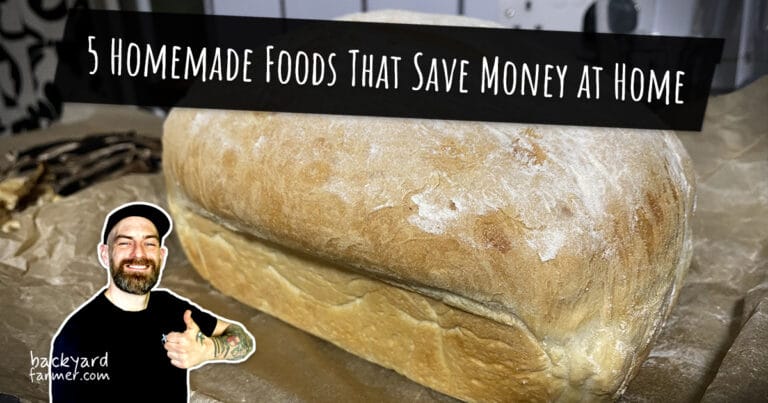Introduction
Cooking from scratch is one of the simplest ways to save money at home while still eating well. Homemade food tastes better, cuts out preservatives, and reduces waste—all without the premium price tag.
Here’s the straightforward version of why it works:
- Real ingredients cost less than ready‑made products.
- You avoid the plastic, fillers, and preservatives in processed foods.
- Cooking small batches means less waste and fewer impulse buys.
- It naturally supports a more eco‑friendly, budget‑cooking lifestyle.
By choosing ingredients over products, my meals feel fresher, simpler, and more intentional. It’s easily one of the most effective ways to save money at home, and these are the five homemade foods I rely on every week to eat well, spend less, and live more sustainably.
5 Things I Cook and Bake to Save Money (And Eat Better)
1. Homemade Bread
Homemade bread is one of the easiest ways to save money at home. Artisan loaves are pricey, and cheap supermarket bread is often stodgy and full of additives. Making your own is simple, clean, and surprisingly quick.
- A basic loaf needs just flour, yeast, olive oil, honey, and salt.
- I buy a 16kg sack of flour to cut the cost even further.
- Once you get into the routine, it’s not messy and barely takes any time.
Once you’ve tasted fresh homemade bread, you won’t want to go back.
2. Homemade Tomato Sauce
A homemade tomato sauce is a core budget cooking staple and one of the biggest money‑savers in my kitchen. Jarred sauces are often watery, overly sweet, and full of preservatives. A simple, flavour-rich sauce costs very little and tastes far better.
- All you need: tinned tomatoes, garlic, herbs, olive oil, and patience.
- Fresh herbs from the garden make it even cheaper and tastier.
- It freezes well and works for pasta, pizza, stews, and more.
It’s a perfect option if you’re cooking on a tight budget.
3. Homemade Brownies
Brownies are a great example of budget baking done right. Shop-bought brownies can cost £3 or more for a tiny pack that rarely satisfies. For the same price, you can make a whole tray at home.
- Better flavour, better ingredients, and far bigger portions.
- They’re quick to prepare and ideal for sharing.
- You avoid paying bakery prices while still getting something indulgent.
Homemade treats feel intentional and far more comforting.
4. Homemade Mayonnaise & Herb-Garlic Dip
Homemade mayo is a forgotten money-saver that helps you cut waste and improve flavour instantly. Shop mayo often tastes thin and artificial, while homemade takes just a minute.
- One egg, some oil, lemon or vinegar, and seasoning.
- Easily turned into a herb & garlic dip or burger sauce.
- Much cheaper than branded jars and no preservatives.
- Cuts down on plastic bottles too — an easy eco-friendly win.
It’s one of the quickest upgrades you can make in the kitchen. For a Garlic and Herb dip, follow this fantastic but simple recipe here.
5. Homemade Fruit Compote
Fruit compote is a simple, tasty addition to cheap healthy meals. Frozen berries are affordable, last ages, and create less waste than buying fresh fruit.
- Cook berries with a splash of lemon and a little sugar.
- Use it on yogurt, porridge, pancakes, or desserts.
- Costs pennies and contains no unnecessary stabilisers or added sugars.
It’s ideal if you want to save money on a tight budget while still eating well.
How These Homemade Staples Fit Into My Routine
I make most of these foods every week, often without even thinking about it. Because they’re fresh and free from preservatives, they don’t last long—and honestly, that’s part of the appeal. This naturally encourages a steady rhythm of cooking that feels more like a lifestyle choice than a chore, especially if you’re trying to find simple ways to save money at home.
To keep things easy, I set aside half a day each week to make the bigger staples. That small block of time keeps me stocked with bread, brownies, or biscuits for days, helping me maintain an intentional, budget‑friendly routine.
Here’s what this approach changes for me:
- I rely on homemade staples instead of convenience foods.
- I avoid reheating full meals, but I always have fresh bits ready.
- Day‑to‑day eating becomes smoother and much less stressful.
This way of cooking has genuinely improved my health and habits. Since nothing is instantly convenient, I snack less. Shopping is quicker too—I buy ingredients, not products, and breeze past most aisles. It’s a subtle shift, yet it’s one of the easiest ways to save money while improving what you eat.
Most importantly, this routine gives me a stronger sense of control and connection to my food. It feels grounded and fulfilling. Knowing I can cook from scratch—or grow some of my own ingredients—brings real confidence, especially when the world feels a bit uncertain. It’s a move toward a slower, fresher, eco‑friendly, almost European approach to food rooted in simple, real ingredients.
What I Save, and the Real Impact on My Life
I’m not completely sure how much I save compared to the average person—everyone shops differently—but my weekly food spend usually sits between £50 and £70. Whether that’s higher or lower isn’t the point. What actually matters is that the quality of what I eat is far better because I make most things from scratch. I know exactly what goes into my food, nothing gets wasted, and every meal feels intentional rather than rushed. It’s easily one of the simplest ways to save money at home while improving your diet.
Where I Save the Most
- Bread and pizza dough save me the most overall.
- Homemade pizza (dough + sauce + cheese + rocket) is better than most takeaways for a fraction of the price.
- These staples are cheap, reliable, and endlessly adaptable—perfect for anyone exploring budget cooking.
Bread Changes Everything
The biggest frustration-saver is definitely bread. I’ve become a full bread snob now—shop loaves just don’t compare. Once you get the hang of it, homemade bread takes very little effort, uses almost no equipment, and tastes like actual food instead of processed filler. It’s one of the easiest habits to build if you’re trying to save money on a tight budget.
How It Affects My Habits
Cooking this way also helps me avoid unnecessary snacking. Since nothing is instantly convenient, I’m less likely to eat out of boredom. I keep nuts and dried fruit around so I don’t destroy a tray of brownies in one go, but overall my eating feels more balanced and intentional.
All of this adds up to a subtle but powerful shift in my lifestyle—one that supports a more eco-friendly, ingredient-led way of living, where food feels more deliberate, more satisfying, and far less wasteful. If you’re interested in turning your homegrown produce into extra income, you might also like my guide on what you can grow to make money, which breaks down some of the easiest and most profitable plants to start with.
Advice for Anyone Wanting to Start Cooking From Scratch
If you’re new to cooking from scratch and looking for simple ways to save money at home, the best thing you can do is start small. You don’t need to jump straight into baking bread or replacing every item in your kitchen. Begin with something easy, like a homemade tomato base sauce for pasta. Roast a few vegetables, blitz them with a hand blender, and you’ve instantly got a fresh, flavourful sauce that beats anything from a jar—and fits neatly into a budget cooking routine.
Ease Into Baking
When you’re ready to try baking, choose forgiving recipes like flapjacks or pancakes. They help you build confidence with mixing, timing, and texture without any pressure. Once you’re comfortable, watch a couple of YouTube videos on making a basic loaf. And remember: you do not need a bread maker. A bowl, your hands, and a bit of patience will take you further than any gadget—especially if you’re trying to save money on a tight budget.
Try a Beginner-Friendly Compote
One of the most beginner-friendly and rewarding recipes is a simple berry compote. Grab a bag of frozen berries, add a splash of lemon and a teaspoon or two of sugar, then cook it on the hob for five minutes—done. Blend it for a smooth sauce if you like. It’s perfect on yogurt, porridge, or pancakes, and it instantly makes breakfast feel special. It’s also one of the easiest ways to create cheap healthy meals without relying on processed products.
Don’t Fear the Learning Curve
A lot of people assume that making bread, pizza dough, or even brownies must be complicated or messy. The truth is that the first attempt might be a bit chaotic, but by your tenth loaf you’ll barely think about it. Like any skill, practice makes the whole process smoother and more enjoyable.
Why It’s Worth It
Beyond saving money, cooking this way improves your health and brings a sense of satisfaction and control you rarely get from ready-made food. My thinking is simple: people work incredibly hard to buy good food—so why not learn to make it yourself and enjoy the process? You can always earn more money, but you can’t buy more time. Cooking from scratch turns everyday meals into something meaningful, grounding, eco-friendly, and genuinely rewarding.
Conclusion
Cooking from scratch isn’t about perfection, and it’s definitely not about making life harder. Instead, it’s about slowing down just enough to enjoy real food, save money, and feel more connected to what you eat. These simple habits quickly become some of the most effective ways to save money at home, because homemade food cuts out preservatives, reduces plastic waste, and tastes far better than anything processed.
Why This Approach Works
- You focus on ingredients, not products.
- Meals become easier and more intentional.
- Shopping, cooking, and decision‑making feel more straightforward.
- You build confidence, skill, and a sense of independence.
This approach is especially powerful if you want to be more eco‑friendly while keeping a budget cooking lifestyle. And the best part is that anyone can start, no matter their experience.
Small Habits, Big Impact
Whether you try homemade bread, a tray of brownies, or just a quick berry compote, these small habits add up to a healthier, cheaper, and more intentional way of living. Cooking from scratch is one of those rare things that gives far more than it takes—and once it becomes part of your weekly routine, it’s hard to imagine going back.





